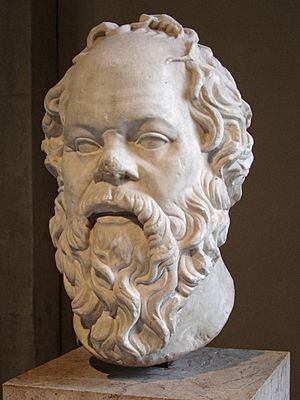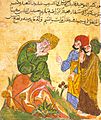Socrates facts for kids
Quick facts for kids
Socrates
|
|
|---|---|

A marble head of Socrates in the Louvre
|
|
| Born | c. 470 BC Deme Alopece, Athens
|
| Died | 399 BC (aged approx. 71) Athens
|
| Cause of death | Execution by the drinking of hemlock |
| Spouse(s) | Xanthippe |
| Era | Ancient philosophy |
| Region | Western philosophy |
| School | Classical Greek philosophy |
| Notable students | |
|
Main interests
|
Epistemology, ethics |
|
Notable ideas
|
Social gadfly Socratic method Socratic intellectualism Socratic paradox Socratic questioning Socratic irony Euthyphro dilemma The unexamined life is not worth living |
|
Influences
|
|
|
Influenced
|
|
Socrates (born around 469 BC, died 399 BC) was a very important Greek philosopher. He didn't just tell people what to think. Instead, he showed how talking, debating, and discussing ideas could help everyone understand tricky problems.
Many of the topics he discussed seemed to be about politics. But deep down, they were about how people should live their lives. Socrates was so influential that philosophers who lived before him are called "Presocratic" philosophers.
Socrates made some enemies. Three people accused him of crimes. In 399 BC, Socrates was put on trial. He was found guilty and sentenced to death. He died by drinking hemlock, which is a plant-based poison. The story of his trial and death is told in a book by his student Plato, called Apologia.
Most of what we know about Socrates comes from Plato's writings. Socrates lived in the Greek city of Athens. His way of teaching was to have a dialogue (a conversation) with his students. They would share an idea, and Socrates would ask them many questions. He would pretend not to know much, saying things like, "I don't know anything; I'm just trying to understand what you mean." This way of teaching is now called the Socratic method.
Socrates is sometimes called the "father of Western philosophy". This is because his discussions brought up some of the most basic questions in philosophy. These questions are still talked about today. Some of his students, like Plato and Alcibiades, became very important and successful people.
Contents
Who was Socrates?
Socrates never wrote any books or essays himself. Everything we know about him comes from what other people wrote. Our main source of information is from his student, Plato. Some of Plato's writings, like the Crito and the Phaedo, are based on real events. They are not exact records, but more like artistic stories showing Socrates in action.
Another student of Socrates, Xenophon, also wrote about him. Aristophanes, a writer known for funny plays, wrote about Socrates in a play called The Clouds. Socrates was an easy person to make fun of. He often walked barefoot and sometimes stood still for hours, lost in thought. In The Clouds, Socrates is shown as a strange person who tries to trick people out of money. However, Plato wrote that Socrates taught for free.
We don't know for sure if Plato's descriptions of Socrates are completely accurate. This is known as the 'Socratic problem'. Many historians believe much of what Plato wrote is true. But some think Plato, who admired Socrates, might have made him seem even greater than he was. Some also believe Plato used Socrates' character to share his own ideas. This is why Socrates remains a mysterious historical figure. Plato's dialogues are beautiful works of art. Most people believe they are based on reality, but were likely changed a bit for the stories.
Socrates' Early Life
Socrates' father was a sculptor, someone who carves statues. His mother was a midwife, who helped women give birth. Socrates might have worked as a stonemason like his father. Plato wrote that Socrates served in the Athenian army as a hoplite, which was a type of soldier. We know he was influenced by an older philosopher named Archelaus. He also talked with anyone in Athens who had interesting ideas. Beyond that, not much is known about his early life.
Socrates was about 50 years old when he married a much younger woman named Xanthippe. They had three children. Socrates sometimes complained about his wife, but it's unclear if he was serious or just joking.
The Oracle's Message
It is said that one of Socrates' friends went to ask the oracle at Delphi if anyone in Athens was wiser than Socrates. An oracle was a person who could supposedly tell the future or give advice from the gods. The oracle said that no one was wiser than Socrates. Oracles were known for saying things that were unclear or could have many meanings. It didn't say Socrates was the wisest, just that no one else was wiser.
Socrates was puzzled by this. He finally decided that his wisdom came from knowing that he didn't know everything. He realized that many people thought they knew a lot, but actually didn't. Socrates believed that by showing people that some of their ideas didn't make sense, he could help them learn. This might explain why some people didn't like him. In Plato's writings, Socrates says he knows nothing. But he can help other people bring out their own ideas, just like his mother helped women give birth.
Why was Socrates put on trial?
In 399 BC, when Socrates was an old man, three citizens named Meletus, Anytus, and Lycon accused him of crimes. A trial was held in ancient Athens. The way trials worked back then was very different from today. There was a jury of 500 men, chosen from the citizens. Both the accusers and Socrates had to speak to the jury themselves. The jury voted to decide if he was guilty. If he was found guilty, both sides would suggest a punishment, and the jury would vote again.
There were two main accusations against Socrates. The general idea was that Socrates was a danger to society.
- The first charge was about his beliefs. They said he didn't believe in the gods of Athens. This was probably meant to make the jury dislike him. But Socrates actually followed all the religious customs of his time. This charge had been used successfully against another philosopher, Anaxagoras.
- The second charge was that he was "corrupting the youth" with his teachings. This wasn't about his personal relationships with students. It was about how they thought he influenced their political ideas. Some of his students were wealthy aristocrats whose ideas were no longer popular in Athens. For example, Alcibiades, who was once a great leader, was now seen as someone who had gone against Athens.
The Trial and Sentence
Crito, a friend of Socrates, secretly paid the prison guards to let Socrates escape. However, Socrates decided not to escape. When he was on trial, he gave a long speech to defend himself against the accusations.
Plato wrote about Socrates' defense in his book, Apologia. It starts with Socrates saying: "I do not know what effect my accusers have had upon you, gentlemen, but for my own part I was carried away by them; their arguments were so convincing. On the other hand, scarcely a word of what they said was true."
When Socrates was asked to suggest his own punishment, he joked. He said that the government should give him free dinners for the rest of his life. He felt he had done good things for society. The court then voted between giving Socrates a fine or putting him to death. The jury decided that Socrates should be put to death.
Socrates' Death
Socrates was not afraid of dying. He didn't try to avoid death by apologizing for his actions. He believed it was right to stick to his principles. Socrates was ordered to drink a cup of hemlock, a poisonous liquid from a plant. He drank it and died soon after.
Plato's Stories of Socrates' Trial and Death
Plato wrote several dialogues (conversations) that tell the story of Socrates' trial and death. They are in order of the events:
- Apologia, or The Apology: This book focuses on Socrates' defense during his trial. Many believe it is accurate in what happened and what was said.
- Crito: This dialogue covers the month between Socrates' trial and his death. In it, Socrates explains to his friend Crito why he will not escape from prison. He also explains why he won't let his friends bribe the jailer.
- Phaedo: This is a longer book, written as if an eyewitness is telling the story of Socrates' last day. Phaedo of Elias reports to a group of friends what Socrates said on his final day.
What were Socrates' main ideas?
Socrates helped people see what might be wrong with their ideas. Sometimes people liked this, but sometimes they were not happy. He said that he, Socrates, was not wise. He famously said that he "knew that he knew nothing." Since other people thought they knew things, but no one truly knows everything, Socrates claimed he knew more than others because he understood his own limits. He also believed that people who do bad things do so because they don't know any better.
Many people today think Socrates was a good man because he didn't harm anyone. He just asked questions about everything. However, during his lifetime, many people thought he was a bad person. They disliked him because he asked those difficult questions. They also felt he made young people unhappy with their lives.
Someone once wrote that Socrates said, "A life that was not examined was not worth living." This means that people should think deeply about their own lives and their purpose. Some people believe that most humans are happier if they don't think too much about their lives.
Socrates also taught that many people can look at something but not truly understand it. He asked important questions about the meaning of life and what it means to be good. These are still very important questions today. A big part of philosophy (which means "love of wisdom") is about these very things.
Socrates' Legacy
Some people see Socrates as a martyr. This means he willingly died to support the idea that knowledge and wisdom are very important.
Socrates is known as one of the most important philosophers in history. He is often called the father of Western philosophy. He didn't start Western philosophy, but he had a huge impact on it. Before Socrates, philosophy mostly focused on mathematics and questions about the natural world. Socrates expanded philosophy to include questions about ethics (what is right and wrong), politics (how societies should be governed), and epistemology (how we know what we know).
Images for kids
-
Battle of Potidaea (432 BC): Athenians against Corinthians (detail). Scene of Socrates (center) saving Alcibiades. 18th century engraving. According to Plato, Socrates participated in the Battle of Potidaea, the retreat of Battle of Delium and the battle of Amphipolis (422 BC)
-
Henri Estienne's 1578 edition of Euthyphro, parallel Latin and Greek text. Estienne's translations were heavily used and reprinted for more than two centuries. Socrates's discussion with Euthyphro still remains influential in theological debates.
-
The statue of Socrates outside the National Library of Uruguay, Montevideo
See also
 In Spanish: Sócrates para niños
In Spanish: Sócrates para niños








